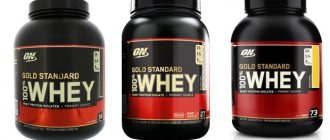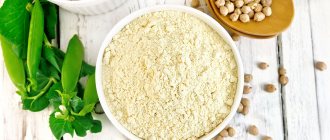The Benefits and Harms of Protein
Almost any fitness magazine you choose will have at least one full-page ad saying that whey protein powder can do wonders for your physique, improve your athletic performance, and strengthen your immune system. But you may also have heard that dairy is inflammatory. So, is whey protein anti-inflammatory or not?
But first, what is whey protein? Simply put, whey is the liquid residue of cheese.
Cow's milk protein is approximately 20 percent whey and the rest is casein , which is the main type of protein found in milk. During cheese production, casein coagulates into the curd and settles to the bottom, while the whey remains in liquid form. When this liquid is drained, dried and processed, we get whey protein powder.
Contrary to what you might think, raw whey contains more than just protein. You will also find a mixture of lactose, fats and minerals. But of course, what we care about most is proteins, and there are many types of proteins found in whey. The main ones are beta-lactoglobulin, alpha-lactalbumin, bovine serum albumin, glycomacropeptide and immunoglobulins. The others, which exist in smaller quantities, are lactoferrin, lactoperoxidase, transferrin and other minor proteins and enzymes.
Potential Health Benefits of Whey Protein.
1) Low blood pressure.
A study published in the International Dairy Journal found that whey protein drinks could help lower blood pressure in adults with hypertension, but not in subjects who did not have high blood pressure.
2) Prevention of prostate cancer.
According to laboratory studies, whey protein may help prevent prostate cancer . When nutritional scientists at Ohio State University exposed human prostate cells to whey protein, the cells' glutathione levels increased by 64 percent. Glutathione is a type of antioxidant that protects cells from free radical damage, which scientists believe can lead to cancer.
3) Reducing inflammation of the lower intestines.
Glycomacropeptide, a protein found in serum, was found to reduce intestinal inflammation comparable to the anti-inflammatory drug sulfasalazine in rats with chemically induced colitis.
4) Increased sensitivity to insulin.
A Swedish study found that whey protein was beneficial for controlling blood sugar levels When participants with type II diabetes ate a high-glycemic index meal with whey protein, they recorded a higher insulin response and lower post-meal blood glucose spikes than when no whey was used.
5) Increase muscle growth and strength.
When combined with strength training, whey protein has been shown to promote muscle growth and strength in active individuals. It is believed that it is the action of branched chain amino acids, especially leucine, found in whey protein that promote protein synthesis.
6) Anti-inflammatory, anti-cancer and antimicrobial effects.
A minor protein called lactoferrin, found in whey protein, has been the subject of active research, and rightly so. Because it has demonstrated anticancer , anti-inflammatory, and antimicrobial properties in several laboratory animal studies. Lactoferrin has been found to boost immunity, prevent cancer, and at the same time be able to suppress immune responses, blocking inflammatory diseases.
7) Reduces the risk of colon cancer.
Whey protein may reduce the risk of colon cancer. In animal studies in which colon cancer was induced, rats fed a whey diet had significantly fewer colon tumors than animals fed casein.
How to choose the right bananas
In order not only to solve the problem of missing weight, but also to fill the body with the beneficial substances contained in these fruits, you need to choose them correctly.
- High-quality fruits are about 20 centimeters or more in length.
- The presence of black dots indicates maximum ripeness and sugar content.
- If possible, purchase unripe, green fruits and bring them to ripeness at home.
- Pay attention to the country of origin - African fruits are considered healthier than Latin American ones.
- Avoid overripening and staleness of fruits to preserve beneficial properties and pleasant taste.
Possible side effects of whey protein.
Despite the possible benefits of whey protein, some people may experience side effects when using whey protein supplements. Additionally, misusing these supplements and purchasing low-quality whey protein products can also present another set of problems.
1) Allergy to milk.
People who are allergic to milk may also be allergic to whey. In this group of people, proteins in milk trigger an immune response that leads to inflammatory symptoms such as vomiting, skin rash, hives, bloating, stomach pain, and diarrhea. Eating foods that constantly put your immune system on high alert is a sure way to fuel the fires of chronic inflammation, no matter how nutritious the food may be.
Therefore, if you are allergic to milk, it may be wise to avoid whey protein supplements and products containing whey protein.
2) Lactose intolerance.
Lactose intolerance is not the same as a milk allergy, although they may have similar symptoms. People with lactose intolerance do not have the necessary enzyme to digest milk sugar (called lactose) and may experience diarrhea, stomach upset and other gastrointestinal discomfort after consuming dairy products. Approximately 75 percent of adults worldwide may have some form of lactose intolerance. Since whey is made from milk, whey protein does contain lactose. And depending on the type of whey protein you buy, some whey products contain more lactose than others.
3) Oxidized cholesterol.
Oxidized cholesterol is formed when cholesterol in foods is exposed to oxygen, processed at high temperatures for a long period of time, or stored for long periods of time. Dairy powders, including whey protein powder, are known to contain some oxidized cholesterol. A study has found that consuming oxidized cholesterol in food may contribute to the development of heart disease.
4) Added chemical additives and heavy metal contamination.
When we buy pure whey protein powder, we expect whey protein and nothing else. But, unfortunately, this is the exception rather than the norm. Many whey protein supplements include chemical sweeteners (such as aspartame, acesulfame-K, saccharin, or sucralose), artificial flavors (such as MSG), and fillers.
Taking some of these chemicals (such as aspartame) over a long period of time can cause a variety of health problems. In addition, some whey protein supplements also contain higher than permitted levels of heavy metals such as arsenic, cadmium, lead and mercury.
5) Excessive protein intake.
Like any other functional food, how you use whey protein can affect its effects. For example, an unbalanced diet that includes large amounts of protein without a proper exercise regimen can cause the excess protein to turn into belly fat rather than muscle mass.
Belly fat , as recent research has shown, is not a dormant substance that does nothing. In fact, it actively secretes hormones and other yet-to-be-identified compounds that can lead to chronic inflammation and therefore chronic diseases such as diabetes and heart disease. Eating such a one-sided diet for a long period of time can also put stress on the kidneys, increase the risk of developing kidney stones, or cause calcium loss.
Other arguments against dairy products.
Here are a few additional arguments against dairy that are also worth considering.
1) Incompatible food.
Milk from each animal species is intended only to meet the nutritional needs of its species. In other words, humans are not designed to consume the milk of other mammals.
2) Unnatural diet.
Cows in feedlots are fed an unnatural diet of grain, antibiotics, growth hormones and other chemicals to increase their growth rate and help them survive poor and stressful living conditions. Some of these toxins are inevitably excreted in milk.
3) Pus and blood in milk.
Constant milking causes inflammation and infection in the cow's udder. This condition, known as mastitis, can cause pus and blood to leak into the milk.
4) Autoimmune diseases.
Some research suggests that certain peptides from bovine serum albumin, a protein found in milk and whey protein, may cause autoimmune diseases such as multiple sclerosis, rheumatoid arthritis and type 1 diabetes, perhaps due to the similarity of some peptide structures to our own fabrics.
Maggi diet - reviews and results with before and after photos
Greetings, my dear readers! Continuing the topic of effective weight loss systems, today I will introduce you to another popular diet. This is the Maggi diet - reviews and results with photos will tell you the best about its effectiveness. I'll tell you what you can eat and what you can't. But first things first.
By the way, especially for you, I wrote recipes for delicious dishes for this diet in a separate article “Maggi diet - menu for every day.” I have prepared an egg and curd meal option for you to choose from.
In general, it would be more correct to call the Maggi diet the “Meiji diet” (a diminutive form of the name “Margaret”). Yes, yes, we are talking about that famous lady - Margaret Thatcher. Among her documents in the Palace of Westminster, historians found a typewritten sheet with a certain menu. This find attracted special attention.
It turns out that such a menu is a fasting nutrition program that was developed specifically for the “iron lady”. It was compiled by specialists from the Mayo Clinic (USA).
The typewritten document contained a warning: “Do not stay on the diet for more than 2 weeks.” And a small clarification note that on days when there is meat in the diet, you can drink whiskey.
And at the end of the sheet there was another warning: “no alcohol on other days.”
By the way, this nutrition plan can be called one of the first low-carbohydrate protein diets. But there is one “but”. The fact is that the original version of the unloading system was passed on by word of mouth. Everyone contributed. Therefore, the modern Maggi diet is somewhat different from the original. But they have a lot in common.
This is a protein food system with an extremely low carbohydrate content. This diet is based on the biochemistry of the body. The menu is designed in such a way that chemical processes are activated, and the body itself begins to burn fat reserves.
The nutrition system is designed for 4 weeks. During this period you can lose from 10 kg to 28 kg of excess weight
Sitting on Maggi, you don't have to count calories. And worry about what if you ate something extra. In other words, it's a "full diet." You can eat eggs, cottage cheese, meat, vegetables and fruits. I like this diet better than mono diets.
I want to share with you, friends, before and after photos of those who have already sat on Maggi. The result is impressive! Watch and be inspired.
Take a close look at the girls' photos. Many people's tummy has tightened and their butt has shrunk. In addition to dieting, the girls say that they started going to the gym or doing fitness. So, comprehensively and gradually, they achieved amazing results.
Therefore, to achieve greater effect, do not forget about high-quality exercises, walks and moderate physical activity.
I myself started doing a “fat burning training” program. Oh, the biggest enemy is our laziness. I stand in front of the mirror and imagine what will happen if I don’t study today. I’m starting to imagine so strongly that I’ll weigh more, won’t fit into my favorite dress, and will stop wearing short skirts. It becomes so scary that laziness shuts up. And there is more than enough energy for training
Dosages
- The dose for one dose of casein protein is 30-40 g. Do not exceed the dosage, because This will not speed up the process, but rather slow it down. In addition, it can cause stomach upset.
- If the goal is to lose fat, take 20 g of casein 3 times a day as a snack.
- If you need to build muscle mass, then add a portion of 40 g per night to 3 doses. This will stop the catabolism process, preserving muscle.
- As an alternative to lunch or dinner. In this case, take 30 g of powder in diluted form.
- Casein protein can be consumed regularly, achieving the required 2 g of protein in the diet for every kilogram of body weight.
The effectiveness of casein protein in gaining muscle mass
Casein demonstrates much less effectiveness in increasing mass than other types. Its use for muscle gain is advisable when the athlete has a decent amount of whey protein.
Gaining weight with casein requires choosing the right time to take it. It is best to drink this type of protein at night. This helps slow down the rate of catabolic processes and protects muscles from the influence of cortisol, called the stress hormone.
Eight hours spent sleeping implies a lack of nutrition, which entails a slowdown in anabolic processes. The use of casein allows you to provide good anti-catabolic protection for this period of time. Whey protein is best consumed during the daytime.
How to prepare and how much casein protein to take?
To prepare the cocktail, you will need a shaker so that it is completely dissolved. One serving of casein is diluted with 300-350 ml of milk or water. The volume of the cocktail is calculated individually, based on body weight, fitness level and energy needs. On average, 25-45 grams of protein (1-2 scoops) provides the body for a period of 8 hours.
Casein protein is very effective for weight loss and fat burning. This is due to the fact that the finished drink helps reduce appetite, but at the same time supplies all the necessary nutrients. For those looking to lose weight, take 15 grams (half a scoop).
The best casein for weight loss
There are two types of casein protein, it all depends on the method of production:
- Sodium/calcium caseinate. This species is extracted using various acids that act on milk. This is a very tough method, but very cheap. The finished product received all the pros and cons of the production method. The cocktail does not taste very pleasant, has a strange smell, and can cause heaviness in the stomach. But the cost of sodium/calcium caseinate makes it accessible to everyone.
- Micellar casein. This type of protein is obtained by ultrafiltration of milk. It's expensive, but the results are worth it. The resulting micellar casein is soft and has a natural milky taste. However, its price is steep.











